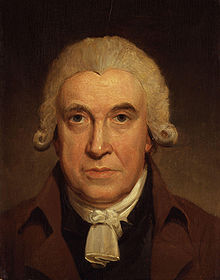ჯეიმზ ვატი
ჯეიმზ ვატი (ინგლ. James Watt; დ. 19 ღურთუთა, 1736, გრინოკი, შოტლანდია — ღ. 19 მარაშინათუთა, 1819, ჰენდსვორტი, ინგლისი)[1] — შოტლანდიარი ინჟინერ-გჷმმაგონებელი დო მათემატიკოსი, ნამუქჷთ 1763-1775 წანეფს, ორქიშ ქვარქვანტეფიშ არსებული დიზაინიშ მოდიფიცირება დო აკოქიმინჷ ალაზჷმაფათ უმოს ეფექტიანი ჟირფა ქიმინჯუაშ ორქიშ ქვარქვანტი აქოკიმინჷ, ნამუსჷთ ამდღა ვატიშ ორიშ ქვარქვანტის უძახჷნა. ჟირფა ქიმინჯუაშ ორქიშ ქვარქვანტიქ გინმაჭყვიდირე როლი ილაჸაფუ ინდუსტრიული რევოლუციაშ მოხვალამაშა დო ხე უნწყუ გოართოიანაფილი ომაფეშ დო ედომუშამ მოსოფელიშ ეკონომიკურ გოვითარაფას.
| ჯეიმზ ვატი | |
| James Watt | |
 | |
| დაბადებაშ თარიღი: | |
|---|---|
| დაბადებაშ აბანი: | |
| ღურაშ თარიღი: |
მარაშინათუთა 19, 1819 (83 წანერი) |
| ღურაშ აბანი: | |
| ომენცარე სფერო: |
გჷმოგონება, მექანიკა |
| ჩინებული რე მუჭოთ: |
ორქიშ მანქანაშ გჷმმაგონებელი |
| ხეშმოჭარუა: | |
ჯეიმზ ვატიშ პატიოცემელო სი სისტემაშ სიძალიერეშ ართულს ვატიქ გიადჷ.
ლიტერატურა
რედაქტირაფა- "Some Unpublished Letters of James Watt" in Journal of Institution of Mechanical Engineers (London, 1915).
- Carnegie, Andrew, James Watt University Press of the Pacific (2001) (Reprinted from the 1913 ed.), ISBN 0-89875-578-6.
- Dickinson, H. W. (1935). James Watt: Craftsman and Engineer. Cambridge University Press.
- H. W. Dickinson and Hugh Pembroke Vowles James Watt and the Industrial Revolution (published in 1943, new edition 1948 and reprinted in 1949. Also published in Spanish and Portuguese (1944) by the British Council)
- Hills, Rev. Dr. Richard L., James Watt, Vol 1, His time in Scotland, 1736-1774 (2002); Vol 2, The years of toil, 1775-1785; Vol 3 Triumph through adversity 1785-1819. Landmark Publishing Ltd, ISBN 1-84306-045-0.
რესურსეფი ინტერნეტის
რედაქტირაფავიკიოწკარუეს? რე ხასჷლა თემაშენ:
- James Watt by Andrew Carnegie (1905)
- James Watt by Thomas H. Marshall (1925)
- Archives of Soho Archived 2011-10-31 ვებ-ხასჷლას Wayback Machine.
- BBC History: James Watt
- Revolutionary Players website Archived 2006-03-08 ვებ-ხასჷლას Wayback Machine.
- Cornwall Record Office Boulton and Watt letters
- Significant Scots - James Watt
სქოლიო
რედაქტირაფა- ↑ Although a number of otherwise reputable sources give his date of death as 19 August 1819, all contemporary accounts report him dying on 25 August and being buried on 2 September. The date 19 August originates from the biography The Life of James Watt (1858, p. 521) by James Patrick Muirhead. It draws its (supposed) legitimacy from the fact that Muirhead was a nephew of Watt and therefore should have been well-informed. In the Muirhead papers, the 25 August date is mentioned elsewhere. The latter date is also given in contemporary newspaper reports (for example, page 3 of The Times of 28 August) as well as by an abstract of and codicil to Watt's last will. (In the pertinent burial register of St. Mary’s Church (Birmingham-Handsworth) Watt's date of death is not mentioned.)
